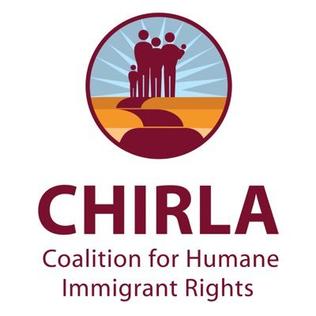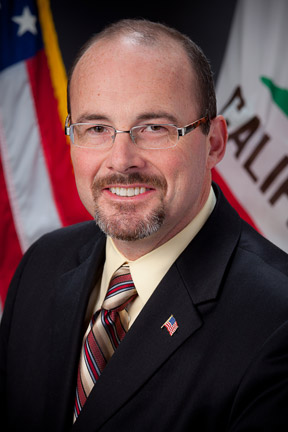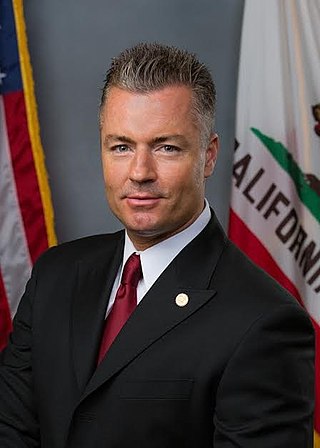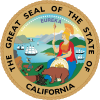
Gilbert Anthony Cedillo is an American politician, who served as a member of the Los Angeles City Council for the 1st district from 2013 to 2022. A member of the Democratic Party, Cedillo was previously a member of both the California State Assembly and the California State Senate.

The Development, Relief, and Education for Alien Minors Act, known as the DREAM Act, is a United States legislative proposal to grant temporary conditional residency, with the right to work, to illegal immigrants who entered the United States as minors—and, if they later satisfy further qualifications, they would attain permanent residency.

Mark Leno is an American politician who served in the California State Senate until November 2016. A Democrat, he represented the 11th Senate district, which includes San Francisco and portions of San Mateo County. Before the 2010 redistricting, he represented the 3rd Senate district.

Kevin Alexander Leon, known professionally as Kevin de León and colloquially as KDL, is an American politician serving as the Los Angeles City Council member for District 14 since 2020. A member of the Democratic Party, he placed second in the 2018 United States Senate election in California against incumbent Senator Dianne Feinstein and third in the 2022 Los Angeles mayoral election.

Equality California or EQCA is a non-profit civil rights organization that advocates for the rights of LGBT people in California. It is the largest statewide LGBT organization in the United States and the largest member of the Equality Federation. The organization is based in Los Angeles.

The Coalition for Humane Immigrant Rights, also known as CHIRLA, is a Los Angeles county-based organization focusing on immigrant rights. While the organization did evolve from a local level, it is now recognized at a national level. The Coalition for Humane Immigrant Rights of Los Angeles organizes and serves individuals, institutions and coalitions to build power, transform public opinion, and change policies to achieve full human, civil and labor rights. The Coalition for Humane Immigrant Rights of Los Angeles also has aided in passing new laws and policies to benefit the immigrant community regardless of documented status.

Nancy Skinner is an American politician and a member of the California State Senate. A Democrat, she represents California's 9th State Senate district, encompassing the East Bay.

John A. Pérez is an American union organizer and politician. He has been a Regent of the University of California since November 17, 2014, previously serving as the 68th Speaker of the California State Assembly from March 1, 2010, to May 12, 2014. A member of the Democratic Party, he represented the 46th district (2008–2012) and 53rd district (2012–2014) in the California State Assembly.
California's Assembly Bill 540 was signed into law by Governor Gray Davis on October 12, 2001, allowing access to in-state tuition rates for undocumented and other eligible students at California's public colleges and universities. The law allows students who attended high school in California, among other eligibility requirements, to pay in-state tuition fees instead of out-of-state tuition at California's public institutions of higher education, including the University of California, California State University, and California Community Colleges. The law has been important in the pursuit of college accessibility for undocumented students in California, but not all beneficiaries are undocumented, as approximately two thirds of those benefitted possess U.S. citizenship.

Tani Gorre Cantil-Sakauye is an American lawyer and jurist who was the 28th Chief Justice of California and is the president/CEO of the Public Policy Institute of California. Nominated by Governor Arnold Schwarzenegger for California's highest judicial office on July 22, 2010, and retained in office by California voters on November 2, 2010, she was sworn in on January 3, 2011 as California's first Filipino and first Woman of Color to serve as California's Chief Justice. Prior to her appointment as chief justice, Cantil-Sakauye had served in judicial offices on California's appellate and trial courts. On July 27, 2022, she announced she would retire and not run for another 12 year term on the court in November and step down on January 1, 2023, leaving Governor Newsom to appoint her replacement. On September 28, 2022, the Public Policy Institute of California announced that Cantil-Sakauye would become its president and chief executive officer, effective January 1, 2023.

Richard Juien-Dah Pan is an American Democratic politician and physician who served in the California State Senate from 2014 to 2022, representing the 6th Senate district, which encompassed parts of Sacramento and Yolo counties. He is also a practicing pediatrician.

Timothy Michael Donnelly is an American Republican politician who was a member of the California State Assembly, representing the 59th and 33rd districts. Before his election to the Assembly in November 2010, Donnelly was a small businessman. He resides in Twin Peaks, California. On January 22, 2013, Donnelly announced his intention to seek the Republican nomination for Governor of California in the 2014 election. He placed third in the open primary, behind incumbent Governor Jerry Brown and investment banker Neel Kashkari, who contested the election in November 2014.

Brian W. Jones is an American politician serving in the California State Senate. A Republican, he represents the 38th State Senate district, encompassing most of inland San Diego County. He previously served in the California State Assembly, representing the 71st district, also encompassing most of inland San Diego County. Prior to being elected to the state assembly, he was a member of the Santee City Council.
The North Carolina Community College System (NCCCS) is the governing body for North Carolina's 58 public community colleges and has been empowered by the state of North Carolina to "adopt all policies, regulations and standards it may deem necessary for operation of the System" by the North Carolina General Assembly. On March 19, 2010, the State Board of Community Colleges approved policy 23 N.C.A.C. 02C .0301 entitled "Admission to Colleges". The State Board has been researching and amending the policy for a decade now and it was implemented on July 10, 2010 after completing the full amendment process. The Admission to Colleges policy states "undocumented immigrants can enter the system's 58 community colleges if they are a graduate of a United States high school, pay out-of-state tuition, and do not displace a North Carolina or United States citizen"

North Carolina House Bill 11, titled "No Post-Secondary Education/Illegal Aliens," was brought before the North Carolina General Assembly by Representative George Cleveland. The bill was introduced on January 31, 2011, and is currently in committee. The bill calls for the prohibition of admission for undocumented students to North Carolina community colleges and universities.

Travis Ethan Allen is an American politician who served as a Republican member of the California State Assembly. Allen was first elected in November 2012 to represent California's 72nd State Assembly district, which includes the cities of Fountain Valley, Los Alamitos, Seal Beach, and Westminster, most of Garden Grove, portions of Huntington Beach and of Santa Ana, and the unincorporated communities of Midway and Rossmoor.
Undocumented youth in the United States are young people living in the United States without U.S. citizenship or other legal immigration status. An estimated 1.1 million undocumented minors resided in the U.S. as of 2010, making up 16% of the undocumented population of 11 million. Undocumented students face unique legal uncertainties and limitations within the United States educational system. They are sometimes called the 1.5 generation, as they have spent a majority of their lives in the United States.
As of July 1 2022, 18 U.S. states, the District of Columbia, and Puerto Rico issue driver's licenses or permits to some or all of the population residing without inspection in the United States. State laws permitting this are on the books in California, Colorado, Connecticut, Delaware, Hawaii, Illinois, Maryland, New Mexico, Nevada, Massachusetts New York, New Jersey, Oregon, Utah, Vermont, Virginia and Washington.
2017 California Senate Bill 54, commonly referred to as "SB 54" and also known as the "California Values Act" is a 2017 California state law that prevents state and local law enforcement agencies from using their resources on behalf of federal immigration enforcement agencies. The law allows for cooperation between local, state and federal law enforcement in cases of violent illegal immigrants, and is often referred to as a "sanctuary law" due to its resemblance of sanctuary jurisdiction policies.

In 2002, Utah legislature passed a law that effectively changed the Utah state code, extending higher education in-state tuition to undocumented immigrants living and attending high school in Utah. The bill was presented in the 2002 general session of the Utah Legislature, and passed in the same session.














